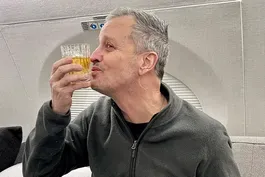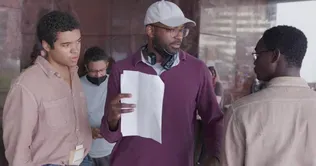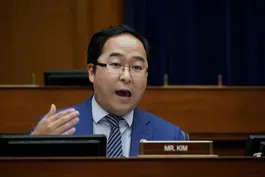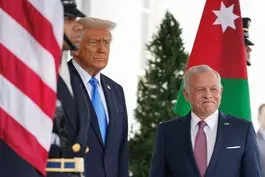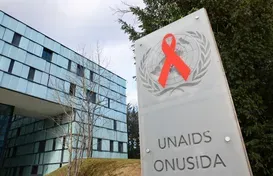
The long-term impact of Trump's cuts to medical research
Clip: 2/11/2025 | 9m 31sVideo has Closed Captions
The possible long-term impact of Trump's cuts to medical research funding
The Trump administration recently announced the National Institutes of Health will make big changes in the way it funds researchers. Scientists say the move will have a huge effect on their work. We hear from medical researchers about the cuts and Amna Nawaz discusses more with Dr. David Skorton of the Association of American Medical Colleges.
Major corporate funding for the PBS News Hour is provided by BDO, BNSF, Consumer Cellular, American Cruise Lines, and Raymond James. Funding for the PBS NewsHour Weekend is provided by...

The long-term impact of Trump's cuts to medical research
Clip: 2/11/2025 | 9m 31sVideo has Closed Captions
The Trump administration recently announced the National Institutes of Health will make big changes in the way it funds researchers. Scientists say the move will have a huge effect on their work. We hear from medical researchers about the cuts and Amna Nawaz discusses more with Dr. David Skorton of the Association of American Medical Colleges.
How to Watch PBS News Hour
PBS News Hour is available to stream on pbs.org and the free PBS App, available on iPhone, Apple TV, Android TV, Android smartphones, Amazon Fire TV, Amazon Fire Tablet, Roku, Samsung Smart TV, and Vizio.
Providing Support for PBS.org
Learn Moreabout PBS online sponsorshipAMNA NAWAZ: The Trump administration recently announced that the National Institutes of Health, or the NIH, will make big changes in the way it funds researchers.
White House officials say they will save $4 billion by capping so-called indirect costs, or what you might think of as traditional operating expenses, that's funding universities that they receive on top of money for direct research.
Those can range from 30 percent to 70 percent in additional funds.
The administration wants to cap that at 15 percent.
Scientists say the move will have a huge effect on their work.
We spoke to medical researchers to hear what they had to say.
CAROLE LABONNE, Northwestern University: Hi.
My name is Carole LaBonne, and I am a professor of molecular biosciences at Northwestern University.
RACHEL HARDEMAN, University of Minnesota: I'm Dr. Rachel Hardeman, and I'm the Blue Cross endowed professor of health and racial equity at the University of Minnesota School of Public health And the founding director of the Center for Antiracism Research for Health Equity at the University of Minnesota.
DR. THEODORE IWASHYNA, Johns Hopkins University: My name's Theodore Iwashyna.
I'm an ICU physician and professor of medicine and health policy at Johns Hopkins University in Baltimore.
CAROLE LABONNE: So, in science, you can think of direct costs as one specific to a particular research project, the chemicals and the cells and the salaries of the researchers.
But then there are the indirect costs of maintaining and replacing equipment, ordering, bookkeeping, handling hazard waste, and compliance with government regulations.
RACHEL HARDEMAN: The NIH decision to shift the indirect costs has an impact on myself and my colleagues and many researchers across the country, because what it means is that a smaller percentage of funding is flowing into our universities and to our institutions to help do very simple things like keep the lights on, make sure we have paper and printers and supplies.
CAROLE LABONNE: All projects of every scientist are being affected.
So take any particular area of research you want, let's say pediatric cancer.
This would amount to a 15 to 20 percent decrease in funding for studying that.
And this is an area where NIH investment has already fueled amazing results.
If it continues like this, it's going to lead to layoffs.
So people are going to lose their jobs.
DR. THEODORE IWASHYNA: All the support staff, all the suppliers, all the other folks who keep the buildings running, keep the labs running, keep the hospital running who depend on the downstream benefits of the NIH funding.
And it's not just taking money away from the scientists.
It's taking money away from the working people who make these universities often the largest employer in their state.
RACHEL HARDEMAN: For those who are not in the research world, it's very easy to think it's not a big deal or that these costs are sort of a luxury for universities.
But they really are a critically important part of how we are able to do our best work and are able to hire the best folks to do that work alongside us.
DR. THEODORE IWASHYNA: A lot of our work right now is about trying to understand pneumonia.
That work all depends on really intensive computation and the ability to do advanced statistical models.
And that all depends on tools that are funded by NIH indirect costs.
If there are no indirect costs flowing, we can't keep the computers running.
If we can't keep the computers running, we can't do the science that we're doing.
CAROLE LABONNE: I think one place where you're seeing the most immediate effect is on the trainees, who are the future of science in this country.
Many are right now questioning the viability of being a scientist in the U.S. going forward.
And who knows how many will end up abandoning their scientific careers, moving to another country, which could lead to further brain drain from the U.S.
This will severely hurt America's leadership and competitiveness in the world.
DR. THEODORE IWASHYNA: If we're supposed to work without buildings, without computers, without centrifuges, there's no way to get that done from someone else.
What's at stake here is the U.S.' dominance in the world of biomedical and health research.
AMNA NAWAZ: For more on all of this.
Let's turn now to Dr. David Skorton.
He's president and CEO of the Association of American Medical Colleges.
Dr. Skorton, thanks for joining us.
DR. DAVID SKORTON, President and CEO, Association of American Medical Colleges: Amna, thanks for having me.
It's a pleasure.
And you sure did a good interview with those folks you just talked to.
They covered a lot of this ground.
These are real costs.
They're reimbursements for real costs, and the folks you talked to told you quite a bit of the story.
AMNA NAWAZ: Well, tell us a little bit more now, because your organization represents, what, 150 medical schools, nearly 500 academic health systems.
Big picture, if those indirect funds are capped,what's your concern about what happens to medical research in America?
DR. DAVID SKORTON: Well, I want to focus on the downstream effect, the most important downstream effect, and that is that people depending on the results of this research for better diagnosis, for better treatment, for actual cures,our neighbors, all of us, we're going to suffer from the lack of the march of science if we cannot do the science.
And as the folks, the researchers that you interviewed have indicated, these are real costs, and I want to emphasize that they're reimbursement for audited real costs.
They will cause us to do less research.
And as important as it is to the researchers and the universities, the most important negative effect of this would be that people just like us would not benefit from the advances of medical science.
AMNA NAWAZ: So tell us more about that.
I mean, what are you hearing from your members across the country now?
What kind of decisions are they having to make now about future research or how they do their work because of this potential cap?
DR. DAVID SKORTON: These are difficult, heartbreaking decisions.
How do you make up for tens of millions of dollars of real costs, audited reimbursements, that could all of a sudden be very arbitrarily taken away?
What they're worried about is all the things that they have to do to make ends meet at the university.
Please no mistake -- make no mistake about it.
Not paying these reimbursed costs, these reimbursable costs, will cause research operations to stop.
The lights will go out, the people will be let go and these advances will not occur, and people at the other end will not get the lifesaving benefits of medical research.
AMNA NAWAZ: As you have seen, though, critics will point out that even a 15 percent cap is higher than private research grants, many of whom cap indirect costs at 10 percent.
They also argue that taxpayers don't need to be the ones who are footing the majority of the overhead costs here.
Here is how one person -- this is Jay Greene from the Center for Education Policy at The Heritage Foundation -- put it.
He wrote: "It is unseemly that universities with billions in endowments are hounding taxpayers to pay for every pencil and administrator partially devoted to producing research.
Cutting overhead will allow more resources to support research and reduce waste."
Dr. Skorton, is there truth to what he's saying?
DR. DAVID SKORTON: It's apples and oranges and other things that are not similar.
And with all respect to that individual, this is somebody who doesn't work in the research world.
First of all, the federal grants, the direct cost of grants do not cover all the costs of research.
That's number one.
Number two, foundations operate by different rules than the federal government.
Some of the costs that are not allowed as so-called direct costs on federal grants can be allowed on some foundation grants.
In fact, you can find on our Web site on AAMC.org a page that actually goes over this.
And when you make up for these differences and when you do an apples-to-apple comparison, there's actually not that much difference.
And then, in terms of the endowments, having been a university president twice, I can tell you that this is really apples to oranges.
Those endowments serve other functions that have to do with the education and research and other things in the institution, not based on reimbursement of research grants from the federal government.
The federal government has a longstanding process to do this.
And I want to give you one example from my own practice if we have time.
So I practiced for decades caring for young people, teenagers and young adults with congenital heart disease, the commonest birth defect.
Some of those were those who have Down syndrome.
Down syndrome.
And Down syndrome as a group has a higher chance of Alzheimer's disease than the general population.
And in 2018, there was a study done, began to understand why some Down's patients are really at risk for dementia and others are not.
This would have enormous benefits not just for Down syndrome patients, but also for those who are worried about dementia.
And aren't we all worried about it?
And the thing I want to say is that that was funded during President Trump's first term, and a lot of wonderful, wonderful medical advances were made, part of his legacy.
It's critically important that we don't savage our ability to do medical research.
AMNA NAWAZ: Dr. David Skorton, president and CEO of the Association of American Medical Colleges, joining us tonight.
Dr. Skorton, thank you.
We appreciate your time.
DR. DAVID SKORTON: Thank you, Amna.
Corruption charges against New York Mayor Eric Adams dropped
Video has Closed Captions
Justice Department drops corruption charges against New York Mayor Eric Adams (5m 20s)
News Wrap: American Marc Fogel released from Russia
Video has Closed Captions
News Wrap: American Marc Fogel released from Russian detention (7m)
'Nickel Boys' director RaMell Ross on his distinct style
Video has Closed Captions
'Nickel Boys' director RaMell Ross on his distinct style and earning an Oscar nomination (6m 46s)
Sen. Kim on why he says U.S. nearing constitutional crisis
Video has Closed Captions
Democratic Sen. Andy Kim explains why he thinks U.S. is nearing a constitutional crisis (6m 46s)
Students keep learning after wildfires destroy schools
Video has Closed Captions
Students and teachers find ways to keep learning after wildfires destroy schools (7m 3s)
Trump repeats Gaza idea as Israel threatens to end ceasefire
Video has Closed Captions
Trump doubles down on Gaza takeover idea as Israel threatens to restart war with Hamas (4m 7s)
UNAIDS says infections could soar if U.S. drops support
Video has Closed Captions
UN AIDS agency says HIV infections could soar worldwide if U.S. drops support (5m 54s)
Providing Support for PBS.org
Learn Moreabout PBS online sponsorshipMajor corporate funding for the PBS News Hour is provided by BDO, BNSF, Consumer Cellular, American Cruise Lines, and Raymond James. Funding for the PBS NewsHour Weekend is provided by...


